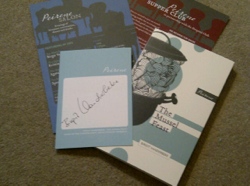Today we are celebrating the IFFP shortlisting of Birgit Vanderbeke’s very fabulous Mussel Feast with a 3-course menu charting the book’s progress from author’s brainchild to finished product. I did think of including part 4: Meet the reader but the idea of interviewing myself felt too weird. However, you, dear blog readers, may interview me (in comments) if you so wish.
For now, though, please enjoy the starter and scroll down/follow the hyperlinks to the main course and dessert.
The Mussel Feast Menu
Starter: Meet the Author (Birgit Vanderbeke)
Main Course: Meet the Translator (Jamie Bulloch)
Dessert: Meet the Editor (Meike Ziervogel)

Birgit Vanderbeke answers:
What was your starting point?
The Mussel Feast came into being in August 1989 during an extraordinary historical situation. No-one knew that the wall would fall but everyone knew that “”something” was on the way and that “something” was about to happen. As I was writing The Mussel Feast, the television constantly broadcast pictures of increasing numbers of East Germans travelling via Austria, Prague and Budapest to the West German embassies. The Monday demonstrations in Leipzig began around that time and people were worried that the East German government might emulate the behaviour of the Chinese government in Tiennamen Square. I also remembered what it was like to move as a 5-year old child from East to West.
Let me add to that a little literary theory. For my thesis I had been thinking about the relationship between metaphor and metonymy. (By the way I was intending to study for a PH.D but The Mussel Feast and other literary pursuits changed that plan.) I really enjoyed putting theory into practice with the mussels. A metaphor loses its power when it becomes part of a metonymy. To this day readers are puzzled by my mussels and wonder how they “work”. That amuses me.
Describe the creative process from that point until it achieved its final German form.
At the beginning of August 1989 I started with the first sentence and wrote quickly and sequentially to the end in one pass, without considering composition, style or aethetics. I believe that I had the material for this first book inside me for a long time and that it, in fact, was part of my inner life – both consciously and subconsciously. Thus, I only had to turn something inside out and transform it without scruple or hesitation. The whole thing took about a month. The following April I spent two days discussing the text with my editor during which we removed one or two redundancies.
Did the fact that it took so long to find an English publisher frustrate you in any way?
It took more than 20 years to find an English editor. Thank you, Meike. However, it didn’t frustrate me. It’s a well-known fact that only a small number of books are translated into English. I did think it a shame though. However, I’m all the happier now. Also slightly amused because it is delightful to watch English readers interpreting the book as if it had just been written, while, in fact, it is nearly 25 years ago. This historical “gap” seems to be one of the distinguishing features of the critical appraisal.
What does the IFFP shortlisting mean to you?
The IFFP shortlisting is a great pleasure and an honour. It is also quite exotic, because England – until recently – was as physically removed from my life as the creation of The Mussel Feast is timewise. And yet, unimaginably I have enjoyed, both physically and mentally, four trips to London in the space of one year.
An off-beat choice for the International Film Festival of Patmos, in some ways, but I wish it the very best of luck all the same.
All thress of these posts are fascinating Lizzy. I loved The Mussel Feast and am backing it to win !
Just stopped everything and read all 3 parts – fascinating discussion of translating fiction and also about seeing your work recognised abroad after 20+ years… Needless to say, I loved the book!
What a fascinating post for a book I loved. I lived in (West) Germany in 1984 and 1985; I, too, could feel something brewing. I’m so glad that Birgit was a le to put into words so eloquently what was happening on a political level, while making it very personal, to me the reader, at the same time.
I haven’t read The Mussel Feast (yet) but I do like the sound of the book. This series of interviews is really interesting, I enjoyed getting to know a bit about the “behind the scenes” of a translation. Thank you!